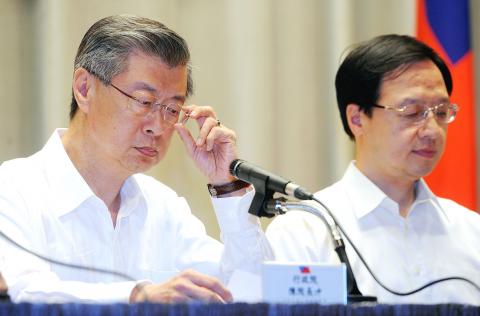President Ma Ying-jeou (馬英九) said yesterday he regrets and feels sorry about allegations of former Executive Yuan secretary-general Lin Yi-shih’s (林益世) involvement in corruption.
“I feel very regretful and apologetic for Lin being implicated in a judicial case,” Ma said on the sidelines of the opening ceremony of Academia Sinica’s annual conference, the top research institute in Taiwan.
Lin, who resigned from his post on Friday, was questioned by prosecutors on Sunday for his alleged role in a bribery case and, according to his lawyer Lai Su-ju (賴素如), Lin confessed his wrongdoings during a 12-hour questioning session that ended early yesterday.

Photo: Liu Hsin-de, Taipei Times
Ma said it was extremely regrettable that a member of his administration has been involved in such a case.
Noting that integrity and incorruptibility constitute the core values and basic moral standard for civil servants, Ma said any official who violates this principle and commits a crime should be dealt with according to the law.
“There is neither a ‘gray area’ nor room for anyone to dodge this rule,” Ma said, adding that his administrative team would learn a lesson from this incident and would become even more cautious and prudent in recruiting personnel.
Ma said his administration would continue to be resolute in fighting against graft and preventing official corruption.
“We will continue our quest for an incorruptible civil service and clean politics,” the president said.
Lin was accused of accepting a bribe of NT$63 million (US$2.15 million) from Chen Chi-hsiang (陳啟祥), the owner of Kaohsiung-based Ti Yung Co (地勇選礦公司), to help the company secure a slag treatment contract.
The contract was offered by China Steel Corp (中鋼) two years ago when Lin was a legislator.
The 44-year-old Lin was also accused of soliciting another bribe of NT$83 million from Chen between February and March this year. When the owner refused to pay up, Lin allegedly pressured China Steel, a listed company in which the government has a controlling stake, to stop supplying slag to Ti Yung for treatment.
Separately yesterday, Premier Sean Chen (陳冲) apologized to the public for the graft case involving Lin.
“I feel deep regret [over Lin’s case],” the premier told a news conference held at the Executive Yuan.
After the case was exposed, he said, the Cabinet launched an internal investigation and offered information to the Supreme Prosecutors’ Office Special Investigation Division. The Cabinet will also work with prosecutors to provide any further information they may need, he added.
The premier reiterated the importance of the integrity of government officials, saying he has asked the government’s anti-corruption agency to strengthen its work to prevent and combat corruption.
Earlier in the day, Lin issued a statement in which he apologized for his misbehavior, saying he deeply regretted his dereliction of duty and getting involved in corruption.
“I would like to apologize to my family members and my supervisors and the public,” Lin said in the statement, adding that he would like to return all illegal money to the nation and devote himself community services.
Prior to his confession, Lin had denied taking bribes from Chen Chi-hsiang or pressurizing anyone into paying bribes.
He filed a lawsuit against the company owner for aggravated libel.
Additional reporting by Rich Chang

Taiwan Semiconductor Manufacturing Co (TSMC, 台積電) is expected to start construction of its 1.4-nanometer chip manufacturing facilities at the Central Taiwan Science Park (CTSP, 中部科學園區) as early as October, the Chinese-language Liberty Times (the Taipei Times’ sister newspaper) reported yesterday, citing the park administration. TSMC acquired land for the second phase of the park’s expansion in Taichung in June. Large cement, construction and facility engineering companies in central Taiwan have reportedly been receiving bids for TSMC-related projects, the report said. Supply-chain firms estimated that the business opportunities for engineering, equipment and materials supply, and back-end packaging and testing could reach as high as

CHAMPIONS: President Lai congratulated the players’ outstanding performance, cheering them for marking a new milestone in the nation’s baseball history Taiwan on Sunday won their first Little League Baseball World Series (LLBWS) title in 29 years, as Taipei’s Dong Yuan Elementary School defeated a team from Las Vegas 7-0 in the championship game in South Williamsport, Pennsylvania. It was Taiwan’s first championship in the annual tournament since 1996, ending a nearly three-decade drought. “It has been a very long time ... and we finally made it,” Taiwan manager Lai Min-nan (賴敏男) said after the game. Lai said he last managed a Dong Yuan team in at the South Williamsport in 2015, when they were eliminated after four games. “There is

POWER PLANT POLL: The TPP said the number of ‘yes’ votes showed that the energy policy should be corrected, and the KMT said the result was a win for the people’s voice The government does not rule out advanced nuclear energy generation if it meets the government’s three prerequisites, President William Lai (賴清德) said last night after the number of votes in favor of restarting a nuclear power plant outnumbered the “no” votes in a referendum yesterday. The referendum failed to pass, despite getting more “yes” votes, as the Referendum Act (公民投票法) states that the vote would only pass if the votes in favor account for more than one-fourth of the total number of eligible voters and outnumber the opposing votes. Yesterday’s referendum question was: “Do you agree that the Ma-anshan Nuclear Power Plant

Democratic nations should refrain from attending China’s upcoming large-scale military parade, which Beijing could use to sow discord among democracies, Mainland Affairs Council Deputy Minister Shen You-chung (沈有忠) said. China is scheduled to stage the parade on Wednesday next week to mark the 80th anniversary of Japan’s surrender in World War II. The event is expected to mobilize tens of thousands of participants and prominently showcase China’s military hardware. Speaking at a symposium in Taichung on Thursday, Shen said that Chinese Minister of Foreign Affairs Wang Yi (王毅) recently met with Indian Prime Minister Narendra Modi during a visit to New Delhi.